Glub-Glub
What are the odds that Wolfgang Petersen’s Poseidon (Warner Bros., 5.12) will be an above-average thrill ride? Pretty good, I’d say. And if you scan the saleable elements it looks like something a lot of people are going to want to see.
The trailer tells you the effects are going to be cool. (That rogue wave gives me the creeps.) Petersen is nothing if not a dependable craftsman, and the movie he’s made, to judge by the trailer, has the look and feel of something fairly well-rigged.
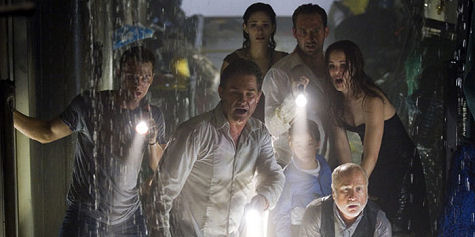
Kurt Russell (front & center)), Josh Lucas (behind Kurt), Emmy Rossum (rear) and Richard Dreyfss (lower right) in Wolfgang Petersen’s Poseidon (Warner Bros., 5.12)
I tend to shy away from big-budget effects movies, but even I’m half into seeing this thing. I really like Kurt Russell, I’ve always enjoyed Richard Dreyfuss (especially if he gets angry) and I’m cool with Josh Lucas playing the lead. If I didn’t expect to see it at a press screening within a week, I’d be okay with buying a ticket.
Why, then, are the Poseidon tracking figures in the toilet?
< ?php include ('/home/hollyw9/public_html/wired'); ?>
This is a very expensive film ($150 million? more?) and it needs to have a huge opening weekend. And yet recent figures say the overall general awareness is 54% compared to 92% for Mission: Impossible III , which opens a week earlier. The definite interests are at 23% — they should be somewhere around 40% at this stage. And the respondents calling Poseidon their first choice are around 3% when this group should be more around 10% or 11% (M:I:3‘s first-choicers are currently at 13%).
Warner Bros. has three weeks to rectify things, but right now they have reason to be worried.
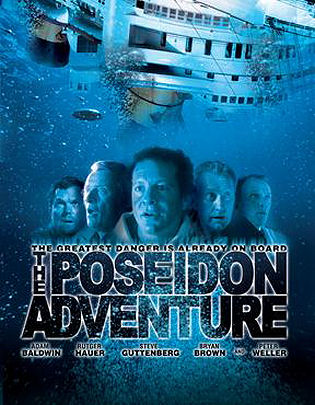
They’ve been advertising on TV, the trailer is playing in theatres all over, and that upside-down-and-underwater-ship one-sheet is already iconic. (If you ask me it deserves to be a nominee at the Key Art awards next year.) And yet so far, the audience waiting to see it doesn’t seem hefty enough.
So what’s happening? Are audiences saying no to big loud disaster movies for some reason? Are people seeing some kind of 9/11 echo in this thing? (It’s not that much of a stretch.) Maybe the same folks who are frowning at the idea of seeing United 93 are doing the same here?
I think you have to lay at least some of the blame on that lousy TV movie, Hall- mark Entertainment’s The Poseidon Adventure, that aired last November. It was critically trashed, it didn’t draw that many viewers and it may have poisoned the well. It was produced by Larry Levinson, directed by Jon Putch and starred Rutger Hauer, Adam Baldwin, Bryan Brown, Steve Guttenberg, Peter Weller and C. Thom- as Howell.
I wonder who greenlit their Poseidon first — Levinson and Hallmark or the Warner Bros. people?
The cast of the Wolfgang Petersen film is of a higher calibre than the TV movie, but not that much higher. Russell will always be Mr. Cool in my book but he’s a long way from his Snake Plissken heyday. And Lucas didn’t show much drawing power last summer when Stealth , a $130 million Rob Cohen thriller that he starred in, ended up with $31,704,4316 (domestic) last September.
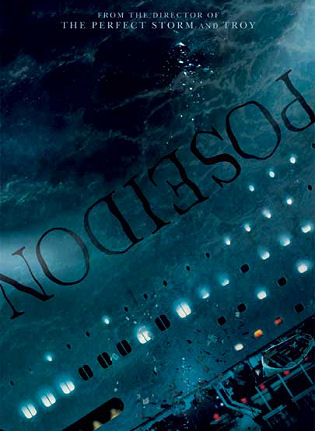
Warner Bros. obviously decided to sink most of the money into special effects rather than big-star salaries, but this may not be enough at the end of the day.
This isn’t a matter of how good the film will be. It’s a matter of marketing, about how many millions of people can be persuaded to pay to see this film on opening weekend based on ads, interest levels, trailers, TV spots, anticipation…whatever.
If the movie plays well and sells itself, it would probably help to sneak it across the country a week before. I mean, that’s as far as my thinking takes me.
Grabs

Paramount Studios parking lot, snapped just after Wednesday morning’s Mission: Impossible III screening — 4.19.06, 1:15 pm.

J.J. Gittes: “Not that Mulwray?” Evelyn Mulwray: “Yes, Mr. Gittes…that Mulwray.”
Bunny Rabbit
I saw Mission: Impossible III (Paramount, 5.3) this morning at screening room #5 at Paramount Studios, and I’m not dissing anyone or anything with the title of this piece. Not even a little bit.
The MacGuffin of J.J. Abrams’ power-packed thriller, after all, is a smallish device called “rabbit’s foot”, and Tom Cruise’s hard-wired performance as IMF agent Ethan Hunt feels, to me, like something new: he’s made himself into the energizer bunny of action heroes. And it works.
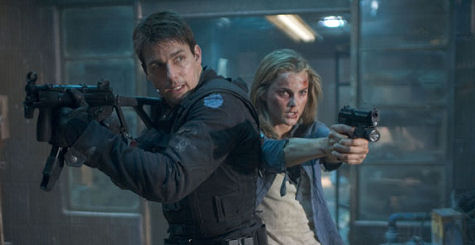
Keri Russell, Tom Cruise in J.J. Abrams’ Mission: Impossible III (Paramount, 5.5)
The advance buzz about M:I:3 being awfully damned good has turned out to be true, I’m afraid — as shallow but very expensive action films go, this is about as good as it gets. But I would hold up on the talk about Phillip Seymour Hoffman stealing the picture from Cruise.
Philly is super-cool — cold and snarly with style to burn — but he hasn’t been given enough ammo — not enough scenes or killer lines — to help him stand up against M:I:3‘s 43 year-old star.
It’s no secret Cruise has been getting (“generating” is closer to the truth) a lot of bad press over the last year or so, with most of it centering on the perception that he’s become overly manic…that his stability is perhaps open to question on some level.
Well, guess what? Cruise answers that perception straight-on in this frenzied summer action film and then rolls right over it like a tank.
He’s made Hunt into a kind of mirror image of hard-core tabloid Tom. It’s like he’s saying, “Okay, fine…you guys think I’ve gone around the bend? All right, then I have! And I’m into it! Being hard-core, I mean.” And this leaves you with feelings of respect for the guy. He may be this or that, but is standing his ground. No backing off! I am what I am!
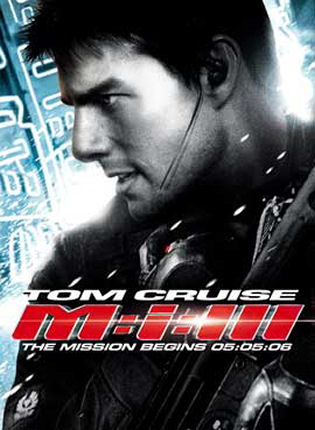
Hunt is a “character,” yes, but based more than ever on the pumping piston rods of Cruise’s personality. A guy who’s all about focus, juice, intensity, endorphins. Sca- ling walls, rapelling down walls. Plotting strategy, eyeballing his costars, running for his life (in more ways than one) and turning tomato red in the face. Neck veins! Neck veins!
And you’re fine with all of this because…I haven’t said this in so many words, have I?…Mission: Impossible III is easily the best of the three M:I‘s. No, I’ll go further: it’s one of the best high-torque summer action films ever.
Brian De Palma’s Mission: Impossible (1996) had two or three brilliantly staged sequences, especially the CIA break-in-and-robbery and the chunnel-train sequence, but some of it was in and out and a lot of people felt confused by the plot.
John Woo’s Mission: Impossible II (2000) was an okay spin on Notorious with Thandie Newton as Ingrid Bergman and Dougray Scott as Claude Rains, and my memories of it aren’t that vivid, so it couldn’t have been that great.
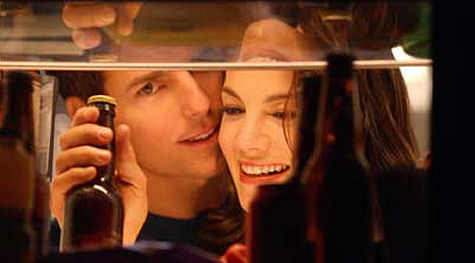
Costar Michelle Monaghan, Cruise
This new one, directed and written by Abrams, is far more relentless and slam- bammy than its predecessors. You’re supposed to give your audience a little downtime between action beats, but this sucker won’t rest. You know the old analogy that action films are like musicals? Mission: Impossible III is almost an opera.
Okay, there’s a mildly relaxing party sequence in the beginning and one or two dialogue-with-Laurence-Fisburne-as-the-obligatory-company-asshole-riding-the- IMF-team scenes, but that’s pretty much it. The rest is all on the treadmill running at 10.
There are four beautifully composed set pieces — a rescue mission in a factory in a Berlin suburb, a kidnapping in the Vatican, an aerial attack on a causeway over Chesapeake Bay, and a break-in and a rescue in Shanghai. But there are always tangents and side-shows connected to these main events, and something riveting is always going on.
This is the kind of summer “ride” movie that even sourpusses like me can sit back and roll with. Shrewd, inventive and into punching the gas. It’s empty, yes — it’s basically just one technical challenge after another, with arguments and a couple of “I love you”‘s thrown in — but this is one of those films in which depth would get in the way.
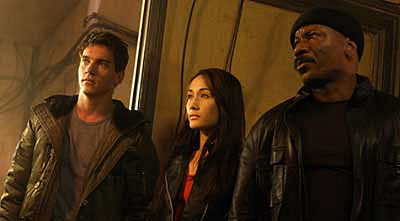
Jonathan Rhys-Meyers, Maggie Q, Ving Rhames
When I hear a film is a “check-your-brain-at-the-door” thing, I know I’m going to hate it. This is not that. It exemplifies what a good geek-level action film should be. Abrams, the director-writer, keeps playing to slightly higher intelligence levels than these films are usually geared to.
Harry Knowles has called M:I:3 “the best damn retooling of True Lies that will ever be done.” Funny, but the only thing I remember about True Lies is liking Tom Arnold’s dialogue and attitude and Bill Paxton’s character begging for mercy in front of Arnold Schwarzenegger by saying he had a “little dick.”
Hold on…it’s coming back to me. Arnold was a secret operative who hadn’t told Jamie Lee Curtis what he really does, and then a job he’s on turns bad and Jamie Lee gets brought into it and so on. Michelle Monaghan is the Jamie Lee character, I guess, but…you know what? Screw this analogy. I’ve never once seen True Lies on DVD, and for a reason.
M:I:3 is about the IM force trying to shut down a ruthless arms and technology dealer named Owen Davian (Hoffman), who’s about as lethal as they come. The story is basically a tit-for-tat game. I’ll kidnap and try to squeeze you for inform- ation, and then you’ll come after me or my girlfriend and try to squeeze me for information, and we’ll see who’s smarter and craftier.
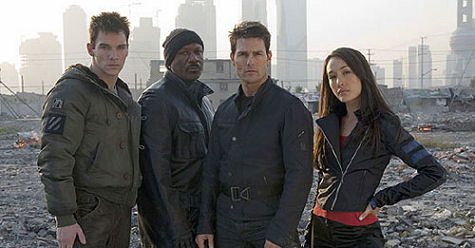
Rhys-Meyers, Rhames, Cruise, Maggie Q in, I think, Shanghai
Abrams starts things off an extremely fierce and intense tone. Right away you’re saying to yourself, “This is good…Abrams clearly knows what he’s doing.” As far as hero-being-tortured, tell-me-what-I- need-to-know-or-else scenes go, I would say it’s up to the level of Laurence Olivier pulling Dustin Hoffman’s teeth out in Marathon Man.
Hoffman’s Damian is the torturer, and it’s a little odd that this is his best scene in the film. He’s nearly spellbinding in just about every scene he’s in, but after Capote and all you’re kind of waiting for Philly to really step up with something climactic and classic…and it never comes. He kicks ass with the lines and scenes he’s been given, but somebody wanted this to be Tom Cruise’s film.
The IMFers — Ving Rhames, Jonathan Rhys Meyers, Maggie Q — hold up their end. Billy Crudup is perfunctory as Cruise’s home-office ally. Simon Pegg (last in Shaun of the Dead) has the obligatory computer-geek-who-saves-the-day-with- crucial-key-punching-in-the-last-act role.
Michelle Monaghan has the meatiest female role as Ethan’s initially clueless wife. Keri Russell burns through strongly in the first act. Maggie Q (Around the World in 80 Days, Rush Hour 2) is…well, she’s fine, but the best thing she does is wear a very hot red dress to a black-tie affair at the Vatican.
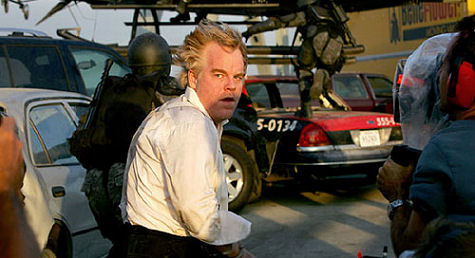
Phillip Seymour Hoffman as Owen Davian
I laughed three times out loud — not at anything “funny” but because I was really enjoying the moxie that went into the writing or acting. I won’t spoil them by sharing.
I had a good enough time with this that I’m going back to see it a second time this evening.
Too many cheerleading pieces and people will start to think I’m a professional kiss-ass, but I have to say it: Tom Cruise’s image problems aren’t going to vanish like that when Mission: Impossible III opens 16 days from now, but they’re probably going to be put on hold.
Gotta Have It
I finally finished reading I Wake Up Screening: What To Do Once You’ve Made That Movie (Watson-Guptill) last week, and it’s one of the most easily processed, best written, most thoroughly sourced books ever written about how to get your indie movie seen (and maybe even distributed!) once it’s more or less finished.
I’m not going all kiss-ass on this book because I’m friendly with its authors, critic- journo John Anderson and Warner Independent marketing exec Laura Kim, or because I know just about every distribution exec, producer’s rep, indie publicist, film festival director, critic and entertainment journalist they’ve quoted.

Park City’s Main Street during the ’04 Sundance Film Festival
I’m saying this because it’s a sharp, cleanly written, well-organized thing, and because it contains lessons that I know are wise and based on hard experience, and because I’ve never read anything of its type quite as good. Really.
L.A. Times critic Kenneth Turan, Magnolia Pictures’ Eamonn Bowles, filmmakers Bill Condon and Kirby Dick, Picturehouse’s Bob Berney, New York Times critic Manohla Dargis, Cinetic’s John Sloss, exhibitor Gregg Leammle, N.Y. Times reporter Sharon Waxman, producer Ted Hope, Sundance honcho Geoff Gilmore, publicist Jeff Hill, Sony Classics’ Michael Barker, Telluride Film Festival director Tom Luddy, Variety‘s Tom McCarthy…these guys and maybe 50 others are quoted.
And there’s a minimum of attitude and self-referential blah-blah in this thing. Every page contains a set-up graph or two plus quotes, quotes, quotes…a set-up graph plus quotes, quotes, quotes. Solid, thoughtful…a very smooth, sans-bullshit read.
The specific advice/lessons for nascent filmmakers include (1) evaluating your film, (2) putting together the perfect team, (3) legal matters, (4) using the right launching pad, (5) sussing Sundance, (6) dealing with the media, (7) the right materials, (8) screeners, (9) the elements of buzz, (10) how not to alienate potential supporters, (11) doing things yourself, (12) finding your audience, and (13) various case studies.
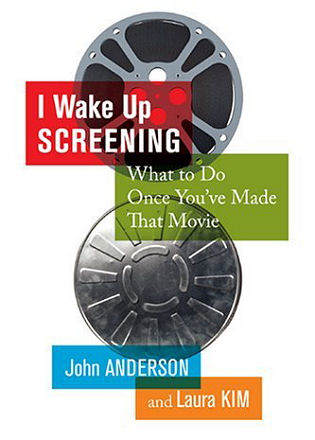
I Wake Up Screening is a how-to manual, but the inside school-of-hard-knocks aroma sets it apart. One or two pages and you’re sold. Trust levels go right up and stay up.
I seriously believe it’s in the realm of choice inside-the-industry books like The Ultimate Film Festival Guide by Chris Gore; The Whole Equation by David Thomson; Easy Riders, Raging Bulls: How the Sex-Drugs-and-Rock ‘N’ Roll Generation Saved Hollywood by Peter Biskind; The New Biographical Dictionary of Film by David Thomson; Final Cut: Art, Money, and Ego in the Making of “Heaven’s Gate” by Steven Bach; The Devil’s Candy: “The Bonfire of the Vanities” Goes to Hollywood by Julie Salamon; The American Cinema: Directors and Directions 1929-1968 by Andrew Sarris; Adventures in the Screen Trade by William Goldman; You’ll Never Eat Lunch in This Town Again by Julia Phillips; and Edward Jay Epstein’s The Big Picture
Every so often I found myself wishing Anderson and Kim had included some ruder, more Peter Biskind-type material (i.e. the kind of quotes and stories that result in certain people refusing to talk to you for four or five years).
And I was a wee bit irritated that they only spoke to (or wrote about) old-media critics and reporters. You’d never know from reading I Wake Up Screening that there are such things as online critics, journalists and buzz-spreaders who wake up and wail every damn day.
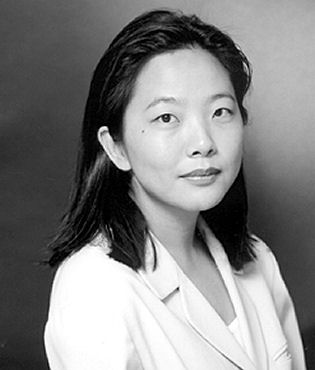
I Wake Up Screening co-author Laura Kim
“Think of yourself running in a mile-long race,” Bradford Patrick writes on the book’s Amazon.com page writes. (Sorry, but this guy’s a fairly good writer.) “You kill yourself to finish the mile, and when you can see the tape, you find out you have four more miles to go!
“That’s exactly how the authors frame the problem for a filmmaker. You got the money scraped together, you shot your film, you’ve been in post cutting the film, and then (and perhaps only then) do you become aware of the millions of details, hurdles, and pitfalls that lie between you and bliss — a theatrical release.
“The authors love film, and want nothing more than for your film to find an audience…but how? This is where the step-by-step analysis of dealing with PR, producer-reps, attorneys, media and buyers all get outed in fascinating detail.”
Anderson and I spoke about the book and the business last weekend, and here’s the recording of it. We got going and our chat lasted about 44 minutes.
Anderson is the chief film critic at Newsday, a past member of the selection committee of the New York Film Festival and a two-time past chair of the New York Film Critics Circle, a member of the National Society of Film Critics, and a member of the National Book Critics Circle.

Screening co-author John Anderson, whose eyes rarely glare like they do here
Kim is exec vp of marketing and publicity for Warner Independent Films. Previously the senior vp of mPRm, she’s worked on such films as (I’m taking this right from the book) American Splendor, Dirty Pretty Things, The Pianist and Being John Malkovich.
Buy it or borrow it from a friend…but if you’re even half into the idea of being a serious filmmaker (now, soon, eventually), definitely read I Wake Up Screening.
(Since tapping this out Monday afternoon I’ve learned that “I Wake Up Screening” was also a title of a 1993 book about indie filming, written by director-writer Frank Gilroy.)
Lost Bash
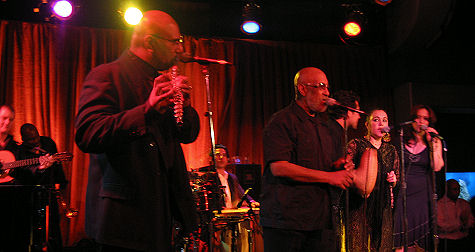
Fantastic jump-up Cuban sounds at Monday night’s after-party following the Hollywood premiere of Magnolia’s The Lost City, a tale of pre-Castro and post-Castro Cuba in the late ’50s and early ’60s, directed by and starring Andy Garcia.

Pretty lady at the party — born in Uruguay, dad was a journalist — who was with Lost City costar Steven Bauer. (I think.)
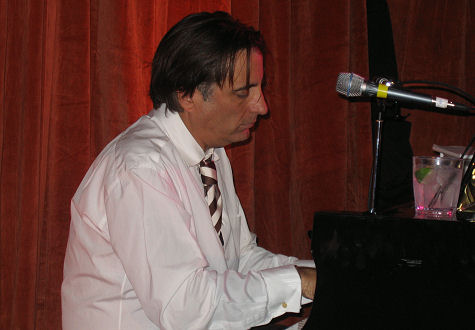
Andy Garcia during the concert portion of the Lost City after-party.

Curiously mesmerizing pool water









